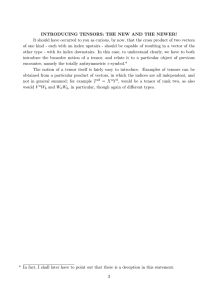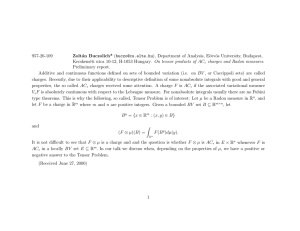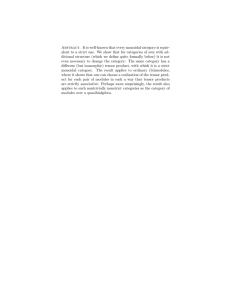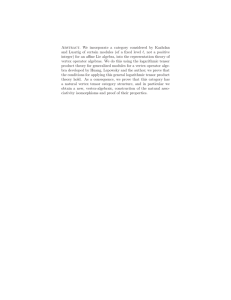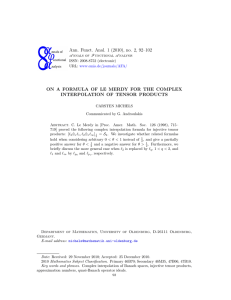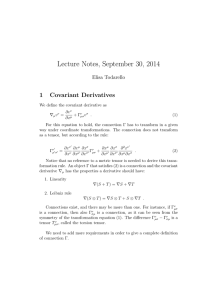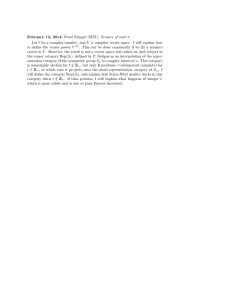A NOTE ON COMPACTNESS OF TENSOR PRODUCTS
advertisement
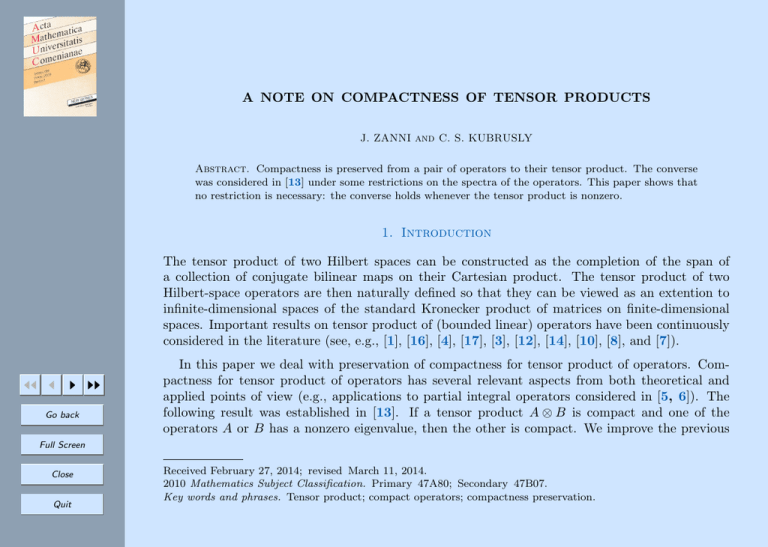
A NOTE ON COMPACTNESS OF TENSOR PRODUCTS
J. ZANNI and C. S. KUBRUSLY
Abstract. Compactness is preserved from a pair of operators to their tensor product. The converse
was considered in [13] under some restrictions on the spectra of the operators. This paper shows that
no restriction is necessary: the converse holds whenever the tensor product is nonzero.
1. Introduction
The tensor product of two Hilbert spaces can be constructed as the completion of the span of
a collection of conjugate bilinear maps on their Cartesian product. The tensor product of two
Hilbert-space operators are then naturally defined so that they can be viewed as an extention to
infinite-dimensional spaces of the standard Kronecker product of matrices on finite-dimensional
spaces. Important results on tensor product of (bounded linear) operators have been continuously
considered in the literature (see, e.g., [1], [16], [4], [17], [3], [12], [14], [10], [8], and [7]).
JJ J
I II
Go back
In this paper we deal with preservation of compactness for tensor product of operators. Compactness for tensor product of operators has several relevant aspects from both theoretical and
applied points of view (e.g., applications to partial integral operators considered in [5, 6]). The
following result was established in [13]. If a tensor product A ⊗ B is compact and one of the
operators A or B has a nonzero eigenvalue, then the other is compact. We improve the previous
Full Screen
Close
Quit
Received February 27, 2014; revised March 11, 2014.
2010 Mathematics Subject Classification. Primary 47A80; Secondary 47B07.
Key words and phrases. Tensor product; compact operators; compactness preservation.
statement by dismissing the spectral condition, and showing that a nonzero tensor product A ⊗ B
is compact if and only if A and B are nonzero compact operators.
2. Preliminaries
Notation, terminology and basic results are posed in this section. Throughout the paper, H and
K are complex infinite-dimensional Hilbert spaces. Inner product in any of them will be denoted
by h· ; ·i. Let B[H, K] stand for the Banach space of all bounded linear transformations of H into
K. A Hilbert-space operator is a bounded linear transformation of a Hilbert space into itself. Set
B[H] = B[H, H], the unital Banach algebra of all operators on H. Let T ∗ ∈ B[H] be the adjoint
of T ∈ B[H]. An operator T ∈ B[H] is compact if it maps bounded sequences into sequences that
have a convergent subsequence (see, e.g., [11, Theorem 4.52 (d)]). For equivalent definitions see,
for instance, [2, Section II.4] or [11, Section 4.9]. Thus T ∈ B[H] is compact if for every bounded
sequence {xn } of vectors xn in H, there exists a subsequence {xnk } of {xn } such that {T xnk }
converges in H.
JJ J
I II
Go back
Full Screen
Close
Quit
The concept of tensor product of two Hilbert spaces can be defined in terms of single tensors which in turn can be defined as conjugate bilinear functionals on the Cartesian product of
H × K (see, e.g., [9]). The single tensor of x ∈ H and y ∈ K is the conjugate bilinear functional
x ⊗ y : H × K → C defined by (x ⊗ y)(u, v) = hx ; uihy ; vi for every (u, v) in H × K. The tensor
product space H ⊗ K of H and K is the completion of the inner product space consisting of all
(finite) sums of single tensors xi ⊗ yi with xi ∈ H and yi ∈ K. The inner product on H ⊗ K is
defined by
DX
i
xi ⊗ yi ;
X
j
E XX
wj ⊗ zj =
hxi ; wj ihyi ; zj i
i
j
P
P
for every i xi ⊗ yi and j wj ⊗ zj in H ⊗ K. The norm on H ⊗ K is the one induced by the
inner product. The tensor product of two operators T ∈ B[H] and S ∈ B[K] is the operator
T ⊗ S : H ⊗ K → H ⊗ K defined by
X
X
X
(T ⊗ S)
xi ⊗ yi =
T xi ⊗ Syi for every
xi ⊗ yi ∈ H ⊗ K,
i
i
i
which lies in B[H ⊗ K]. The proposition below summarizes some basic well-known properties of
tensor products in a Hilbert space setting that will be required in the sequel (see, e.g., [9]). (Here
kT k denotes the induced uniform norm of T on B[H], and kT ⊗ Sk the induced uniform norm of
T ⊗ S on B[H ⊗ K].)
Proposition 1. Take α, β ∈ C, x, w ∈ H, y, z ∈ K, T, A ∈ B[H], and S, B ∈ B[K] arbitrary. The
following identities hold true:
JJ J
I II
Go back
(a) α β(x ⊗ y) = α x ⊗ β y,
α β(T ⊗ S) = α T ⊗ β S,
(b) (x + w) ⊗ (y + z) = x ⊗ y + w ⊗ y + x ⊗ z + w ⊗ z,
(T + A) ⊗ (S + B) = T ⊗ S + A ⊗ S + T ⊗ B + A ⊗ B,
(c) T A ⊗ SB = (T ⊗ S)(A ⊗ B),
(d) (T ⊗ S)∗ = (T ∗ ⊗ S ∗ ),
(e) kx ⊗ yk = kxk kyk,
kT ⊗ Sk = kT k kSk.
For further properties on tensor products, see, for instance, [9] and [15].
Full Screen
3. Tensor Product and Compact Operators
Close
Quit
Consider the following result presented in this journal [13, Theorem 2].
Theorem 1. If A ∈ B[H] and B ∈ B[K] are compact, then A ⊗ B ∈ B[H ⊗ K] is compact.
Conversely, if A ⊗ B ∈ B[H ⊗ K] is compact and one of A ∈ B[H] or B ∈ B[K] has a nonzero
eigenvalue, then the other is compact.
Remark 1. It is worth noticing that part of the results in [13] was worked out for separable
Hilbert spaces, although the preceding Theorem 1 does not require that the Hilbert spaces are
separable, as well as the forthcoming Theorem 2. Indeed, the direct assertion in Theorem 1 (but
not the converse) was proved in [13] by using the fact that a compact operator on a Hilbert space
(not necessarily separable) is the uniform limit of finite-rank operators — see, e.g., [2, Theorem
II.4.4] or [11, Problem 5.42(b)]. This, however, also holds in a Banach space with a Schauder basis
(which turns out to be separable) — see, e.g., [11, Problem 4.58].
We improve the converse in Theorem 1 by showing in Theorem 2 that if A ⊗ B is nonzero and
compact, then so are both A and B without any restriction on their spectra. First we need the
following elementary auxiliary result which says that if a sequence of single tensors converges, then
it must converge to a single tensor.
Lemma 1. Take sn = x ⊗ yn ∈ H ⊗ K with x ∈ H and yn ∈ K for each positive integer n. If
{sn } converges in H ⊗ K to s ∈ H ⊗ K, then s = x ⊗ y for some y ∈ K.
JJ J
I II
Go back
Full Screen
Close
Quit
Proof. Let {sn } be a sequence of vectors in H ⊗ K as in the lemma statement. If {sn } converges
in H ⊗ K, then {sn } is a Cauchy sequence,
ksm − sn k → 0
as m, n → ∞.
Since sm − sn = x ⊗ ym − x ⊗ yn = x ⊗ (yn − ym ), and since kx ⊗ (yn − ym )k = kxk kyn − ym k,
it follows that
kxk kyn − ym k → 0 as m, n → ∞.
Thus {yn } is a Cauchy sequence in K. Since K is a Hilbert space, {yn } converges in K to, say,
y ∈ K. Since {sn } converges, let s be its limit in H ⊗ K, so that (by continuity of the conjugate
bilinear functional)
s = lim sn = lim(x ⊗ yn ) = x ⊗ lim yn = x ⊗ y.
n
n
n
Theorem 2. If A ⊗ B is a nonzero compact tensor product in B[H ⊗ K], then both A ∈ B[H]
and B ∈ B[K] are nonzero compact operators.
Proof. Suppose A ⊗ B 6= O in B[H ⊗ K]. Thus A 6= O and B 6= O in B[H] and B[K]. Since
A 6= O, there exists x 6= 0 in H such that kAxk =
6 0. Take an arbitrary bounded sequence {yn } of
vectors yn in K, and let {sn } be a sequence of single tensors sn in H ⊗ K given by sn = x ⊗ yn for
each positive integer n. Note that {sn } is bounded because {yn } is bounded. In fact,
sup ksn k = sup kx ⊗ yn k = sup kxk kyn k = kxk sup kyn k < ∞.
n
n
n
n
Thus, if A ⊗ B is compact, then there exists a subsequence {snk } of {sn } such that {(A ⊗ B)snk }
converges in H ⊗ K. Hence, by Lemma 1,
(A ⊗ B)snk = (A ⊗ B)(x ⊗ ynk ) = Ax ⊗ Bynk → Ax ⊗ z
JJ J
I II
Go back
Full Screen
Close
Quit
for some z ∈ K (not necessarily in the range of B, since the range of B is not necessarily closed in
K). Then, by Proposition 1(a, b, e),
kAxkkBynk − zk = kAx ⊗ (Bynk − z)k = kAx ⊗ Bynk − Ax ⊗ z)k
= k(A ⊗ B)(x ⊗ ynk ) − Ax ⊗ zk = k(A ⊗ B)snk − Ax ⊗ zk → 0.
Therefore, since kAxk =
6 0, it follows that Bynk → z. Outcome: Recalling that {yn } was taken to
be an arbitrary bounded sequence, then we can conclude that for every bounded sequence {yn }
of vectors yn in K, there exists a subsequence {ynk } of it such that {Bynk } converges in K. This
means that B is compact. Symmetrically, if A ⊗ B is nonzero and compact, then A is compact. Theorems 1 and 2 together yield a complete characterization of compactness preservation for
tensor products.
Corollary 1. A tensor product A ⊗ B ∈ B[H ⊗ K] is nonzero and compact if and only if
A ∈ B[H] and B ∈ B[K] are both nonzero and compact.
JJ J
I II
Go back
Full Screen
Close
Quit
1. Brown A. and Pearcy C., Spectra of tensor products of operators, Proc. Amer. Math. Soc. 17 (1966), 162–166.
2. Conway J. B., A Course in Functional Analysis, 2nd ed., Springer, New York, 1990.
3. Duggal B. P., Tensor products of operators – strong stability and p-hyponormality, Glasgow Math. J. 42 (2000),
371–381.
4. Eschmeier J., On the spectra of tensor products of linear operators in Banach spaces, J. Reine Angew. Math.
244 (1970), 119–153.
5. Gil’ M. I., Regular functions of operators on tensor product of Hilbert spaces, Journal of Integral Equations
and Operators 4 (2006), 317–331.
6.
, Spectrum and resolvent of a partial integral operator , Appl. Anal. 87 (2008), 555–566.
7.
, Estimates for resolvents and functions of operator pencils on tensor products of Hilbert spaces, Kyoto
J. Math. 51 (2011), 673–686.
8. Kitson D., Harte R. and Hernandez C., Weyl’s theorem and tensor products: a counterexample, J. Math. Anal.
Appl. 378 (2011), 128–132.
9. Kubrusly C. S., A concise introduction to tensor product, Far East J. Math. Sci. 22 (2006), 137–174.
10.
, Invariant subspaces of multiple tensor products, Acta Sci. Math. (Szeged) 75 (2009), 679–692.
11.
, The Elements of Operator Theory, Birkhäuser/Springer, New York, 2011.
12. Kubrusly C. S. and Duggal B. P., On Weyl and Browder spectra of tensor products, Glasgow Math. J. 50
(2008), 289–302.
13. Kubrusly C. S. and Levan N., Preservation of tensor sum and tensor product, Acta Math. Univ. Comenian. 80
(2011), 132–142.
14. Kubrusly C. S. and Vieira P. C. M., Convergence and decomposition for tensor products of Hilbert space operators, Oper. Matrices 2 (2008), 407–416.
15. Ryan R. A., Introduction to Tensor Products of Banach Spaces, Springer, London, 2002.
16. Schechter M., On the spectra of operators on tensor products, J. Functional Analysis 4 (1969), 95–99.
17. Stochel J., Seminormality of operators from their tensor product, Proc. Amer. Math. Soc. 124 (1996), 135–140.
J. Zanni, Catholic University of Rio de Janeiro, 22453-900, Rio de Janeiro, RJ, Brazil,
e-mail: jzanni@gmail.com
C. S. Kubrusly, Catholic University of Rio de Janeiro, 22453-900, Rio de Janeiro, RJ, Brazil,
e-mail: carlos@ele.puc-rio.br
JJ J
I II
Go back
Full Screen
Close
Quit
